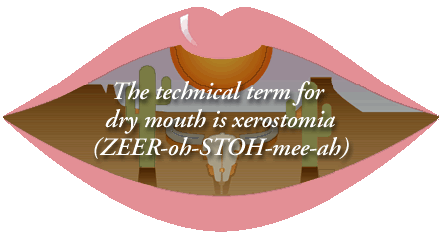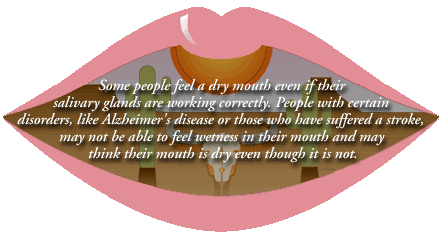Dry Mouth Information
Dry mouth is the feeling that there is not enough saliva in the
mouth.
Everyone has a dry mouth once in a while -- if you are nervous,
upset or under stress.
But if you have a dry mouth all or most of the time, it can be uncomfortable
and can lead to serious health problems. It can also
be a sign of certain diseases and conditions.
Dry Mouth
- can cause difficulties in tasting, chewing, swallowing, and speaking
- can increase your chance of developing dental decay and other infections in the mouth
- can be caused by certain medications or medical treatments
Dry mouth is not a normal part of aging. So if you think you have dry mouth, see your dentist or physician. There are oral health related things you can do to get dry-mouth relief.

Symptoms of Dry Mouth include:
- a sticky, dry feeling in the mouth
- trouble chewing, swallowing, tasting, or speaking
- a burning feeling in the mouth
- a dry feeling in the throat
- cracked lips
- a dry, rough tongue
- mouth sores
- an infection in the mouth
Why is Saliva so Important?
Saliva does more than keep the mouth wet.
- It helps digest food
- It protects teeth from decay
- It prevents infection by controlling bacteria and fungi in the mouth
- It makes it possible for you to chew and swallow
Dry mouth caused by insufficient saliva can develop tooth decay or other infections in the mouth. You also might not get the nutrients you need if you cannot chew and swallow certain foods.

Causes Dry Mouth
People get dry mouth when glands in the mouth that make saliva are not working properly. Because of this, there might not be enough saliva to keep your mouth wet. There are several reasons why these glands (called salivary glands) might not work right.
- Side effects of some medicines - More than 400 medicines can cause the salivary glands to make less saliva. Medicines for high blood pressure and depression often cause dry mouth.
- Disease - Some diseases affect the salivary glands. Sj-gren's Syndrome, HIV/AIDS, diabetes, and Parkinson's disease can all cause dry mouth.
- Radiation therapy - The salivary glands can be damaged if they are exposed to radiation during cancer treatment.
- Chemotherapy - Drugs used to treat cancer can make saliva thicker, causing the mouth to feel dry.
- Nerve damage - Injury to the head or neck can damage the nerves that tell salivary glands to make saliva.
What can be Done about Dry Mouth?
Dry mouth treatment will depend on what is causing the problem. If you think you have dry mouth, see your dentist or physician. He or she can try to determine what is causing your dry mouth.
- If your dry mouth is caused by medicine, your physician might change your medicine or adjust the dosage.
- If your salivary glands are not working right but can still produce some saliva, your physician or dentist might give you a medicine that helps the glands work better.
- Your physician or dentist might suggest that you use artificial saliva to keep your mouth wet.
What can I do about Dry Mouth?
- Sip water or sugarless drinks often.
- Avoid drinks with caffeine, such as coffee, tea, and some sodas. Caffeine can dry out the mouth. Click-here for Health Tip-of-the-Day.
- Sip water or a sugarless drink during meals. This will make chewing and swallowing easier. It may also improve the taste of food.
- Chew sugarless gum or suck on sugarless hard candy to stimulate saliva flow; citrus, cinnamon or mint-flavored candies are good choices.
- Don't use tobacco or alcohol. They dry out the mouth.
- Be aware that spicy or salty foods may cause pain in a dry mouth.
- Use a humidifier at night.
Information on How is Dry Mouth Treated
Dry mouth treatment will depend on what is causing the problem. If you think you have dry mouth, see your dentist or physician. He or she can help to determine what is causing your dry mouth. If your dry mouth is caused by medicine, your physician might change your medicine or adjust the dosage.
Types of Foods and Beverages you should Avoid if you have Dry Mouth
You should avoid sticky and sugary foods. If you do eat them, brush immediately afterwards. Also, be aware that spicy and salty foods can cause pain in a dry mouth.
You should also avoid drinks with caffeine and alcohol. They can dry out the mouth.
Foods and Beverages that are Beneficial if you have Dry Mouth
You should drink water or sugarless drinks. They make chewing and swallowing easier when eating. Also, sugarless gum and sugarless hard candy are beneficial because they can stimulate saliva flow if your salivary glands are still capable of producing some saliva.
Kind of Toothpaste you should use to Keep your Teeth Healthy
You should use toothpaste with fluoride in it. Most toothpaste sold at grocery and drug stores have fluoride in them.
Type of Mouthwash you should use to Keep your Mouth Healthy
You should use mouthwashes that do not contain alcohol. Alcohol can dry out the mouth.
How often should you Visit a Dentist?
You should visit your dentist for a check-up at least twice a year -- and more often if you have dry mouth. Your dentist might give you a special fluoride solution that you can rinse with to help keep your teeth healthy.
Tips for Keeping your Teeth Healthy
If you have dry mouth,
you need to be extra careful to keep your teeth healthy. The following
information will help you deal
with dry mouth:
- Gently brush your teeth at least twice a day.
- Floss your teeth every day.
- Use toothpaste with fluoride in it. Most toothpastes sold at grocery and drug stores have fluoride in them.
- Avoid sticky, sugary foods. If you do eat them, brush immediately afterwards.
- Visit your dentist for a check-up at least twice a year. Your dentist might give you a special fluoride solution that you can rinse with to help keep your teeth be healthy.




